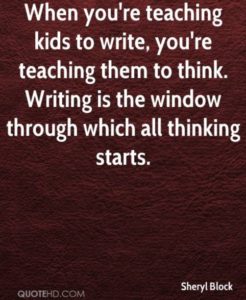“Me, write?” Teaching written language to boys

To be able to write well, boys must be able to read. Reading exposes boys to the language of writing. Boys are reluctant to write because it is a really complex activity that they have to learn. As parents and teachers, we need to employ strategies that encourage boys’ interest in the writing process.
There are two aspects to writing:
1) The physical effort
Boys need to hone the physical effort required to control a pencil on paper and form the letters accurately.

2) The forming of words and ideas
This one often leads boys to distracting behaviour and reluctance to write. Boys need the ability to form words, thoughts and ideas in order to create the written language necessary to communicate with an audience.
Boys are often turned off writing by the very first step mentioned above. Boys’ fine motor skills often develop after their gross motor skills ~ which explains why they can kick a ball, swing a bat or ride a bike much more easily than they can hold a pencil. Handwriting sessions in early primary can be burdensome for boys and if it’s a struggle then they experience their first feelings of writing ‘failure’. So we need to ensure that boys are developmentally and physically ready to write and keep it positive!
Let’s look at some specific schemes that will get boys writing with enthusiasm:
1) Utilising technology
For some boys, technology can make all the difference as to whether some boys will become effective writers. Voice recognition and speech-to-text software can assist those boys with hand-eye coordination or difficulty with fine motor skills to record and express their ideas. Remember that in writing the most important factor is the language you use to express your ideas, describe the storyline or express a feeling.
2) Provide a supportive scaffold

As a teacher, many of my students struggled to get started with their writing. A child’s interest in writing must originate from a background of having stories read to them. Boys need story starters and ways to organise their thoughts. Allow the beginner writer to either draw or orally explain their story to an adult or older buddy before writing. This will assist them in sorting out the character, the setting, the plot and the sequence of events.
Older writers benefit from a clear model that specifies what is required. In class, I’ve seen older boys produce amazing comic books or storyboards as the first steps to writing excellent pieces. These visual cues really suit the learning styles of a number of boys.
Check out this online FREE Story prompts ~ useful for both teacher and parents. This will deliberately help your son to move past their fear of coming up with ideas.
Zip! Zam! Boom! Click here for comic strip printables – complete with speech bubbles.
3) Knowing the structure
Boys need to understand the rules and structures of effective writing. Look at it like a set of stairs ~ start with a good foundation, then extend and add more ‘steps’ in the writing process. Keep it fun – boys love humour (so use examples of poor writing) and use movement and drama.
4) Great topics
Like reading, boys have preferred topics. Those that appeal usually include action, violence or a gross factor. Once boys start writing about their preferred topics and are experiencing success, then present them with different topics and genres.
5) Boys need to see men write
Just as boys need to see males read, they need to see them write. Many creative, successful and inventive men have struggled to write at school. Use these men as examples. Bring in older boys or young men into the class to share their writing. Share snippets from great male (and female) authors. It’s great if we let our boys know that they are not alone in their struggle to learn the skills of writing.
It is very beneficial that both school and home provide boys with strategies that promote interest and develop their skills in writing.
Parents ~ sign up for a free 30-day trial and improve your son’s literacy for the upcoming year!
As an educator, do you want more from your literacy program? Contact us for a 30-day free trial in your school or classroom. Sign up for our newsletter and get FREE Comprehension Worksheets for Years 3 to 9.
Check out our blogs for more ideas and tips.
Steps to Successfully Support Disengaged Learners
See us featured in The Educator Australia magazine
Research confirms that early reading boosts literacy
Boys Love LFB – Here’s what they have to say!
Get boys reading in the digital age
Why write? Tips for reluctant writers
Brought to you by Tanya Grambower

